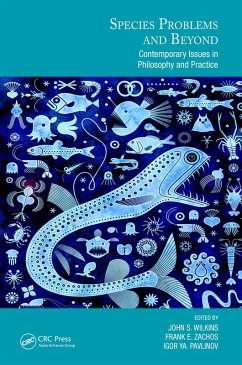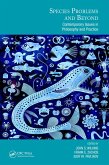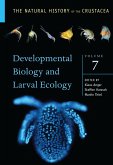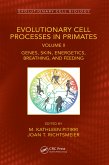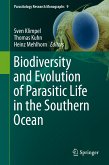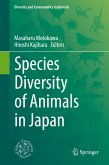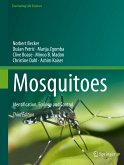Species Problems and Beyond (eBook, PDF)
Contemporary Issues in Philosophy and Practice
Redaktion: Wilkins, John S.; Pavlinov, Igor Ya.; Zachos, Frank E.
51,95 €
51,95 €
inkl. MwSt.
Sofort per Download lieferbar

26 °P sammeln
51,95 €
Als Download kaufen

51,95 €
inkl. MwSt.
Sofort per Download lieferbar

26 °P sammeln
Jetzt verschenken
Alle Infos zum eBook verschenken
51,95 €
inkl. MwSt.
Sofort per Download lieferbar
Alle Infos zum eBook verschenken

26 °P sammeln
Species Problems and Beyond (eBook, PDF)
Contemporary Issues in Philosophy and Practice
Redaktion: Wilkins, John S.; Pavlinov, Igor Ya.; Zachos, Frank E.
- Format: PDF
- Merkliste
- Auf die Merkliste
- Bewerten Bewerten
- Teilen
- Produkt teilen
- Produkterinnerung
- Produkterinnerung

Bitte loggen Sie sich zunächst in Ihr Kundenkonto ein oder registrieren Sie sich bei
bücher.de, um das eBook-Abo tolino select nutzen zu können.
Hier können Sie sich einloggen
Hier können Sie sich einloggen
Sie sind bereits eingeloggt. Klicken Sie auf 2. tolino select Abo, um fortzufahren.

Bitte loggen Sie sich zunächst in Ihr Kundenkonto ein oder registrieren Sie sich bei bücher.de, um das eBook-Abo tolino select nutzen zu können.
This book presents opposing views on the current philosophical and conceptual issues of the Species Problem in biology. Topics include ontology of species, definitions of species category and units, species rank, speciation issues, nomenclature, ecology, and species conservation.
- Geräte: PC
- ohne Kopierschutz
- eBook Hilfe
- Größe: 5.13MB
Andere Kunden interessierten sich auch für
![Species Problems and Beyond (eBook, ePUB) Species Problems and Beyond (eBook, ePUB)]() Species Problems and Beyond (eBook, ePUB)51,95 €
Species Problems and Beyond (eBook, ePUB)51,95 €![Extreme Environments (eBook, PDF) Extreme Environments (eBook, PDF)]() Extreme Environments (eBook, PDF)69,95 €
Extreme Environments (eBook, PDF)69,95 €![Developmental Biology and Larval Ecology (eBook, PDF) Developmental Biology and Larval Ecology (eBook, PDF)]() Developmental Biology and Larval Ecology (eBook, PDF)112,95 €
Developmental Biology and Larval Ecology (eBook, PDF)112,95 €![Evolutionary Cell Processes in Primates (eBook, PDF) Evolutionary Cell Processes in Primates (eBook, PDF)]() Evolutionary Cell Processes in Primates (eBook, PDF)48,95 €
Evolutionary Cell Processes in Primates (eBook, PDF)48,95 €![Biodiversity and Evolution of Parasitic Life in the Southern Ocean (eBook, PDF) Biodiversity and Evolution of Parasitic Life in the Southern Ocean (eBook, PDF)]() Biodiversity and Evolution of Parasitic Life in the Southern Ocean (eBook, PDF)129,95 €
Biodiversity and Evolution of Parasitic Life in the Southern Ocean (eBook, PDF)129,95 €![Species Diversity of Animals in Japan (eBook, PDF) Species Diversity of Animals in Japan (eBook, PDF)]() Species Diversity of Animals in Japan (eBook, PDF)217,95 €
Species Diversity of Animals in Japan (eBook, PDF)217,95 €![Mosquitoes (eBook, PDF) Mosquitoes (eBook, PDF)]() Norbert BeckerMosquitoes (eBook, PDF)113,95 €
Norbert BeckerMosquitoes (eBook, PDF)113,95 €-
-
-
This book presents opposing views on the current philosophical and conceptual issues of the Species Problem in biology. Topics include ontology of species, definitions of species category and units, species rank, speciation issues, nomenclature, ecology, and species conservation.
Dieser Download kann aus rechtlichen Gründen nur mit Rechnungsadresse in A, B, BG, CY, CZ, D, DK, EW, E, FIN, F, GR, HR, H, IRL, I, LT, L, LR, M, NL, PL, P, R, S, SLO, SK ausgeliefert werden.
Produktdetails
- Produktdetails
- Verlag: Taylor & Francis eBooks
- Seitenzahl: 382
- Erscheinungstermin: 14. Juni 2022
- Englisch
- ISBN-13: 9781000549799
- Artikelnr.: 63999331
- Verlag: Taylor & Francis eBooks
- Seitenzahl: 382
- Erscheinungstermin: 14. Juni 2022
- Englisch
- ISBN-13: 9781000549799
- Artikelnr.: 63999331
- Herstellerkennzeichnung Die Herstellerinformationen sind derzeit nicht verfügbar.
John Wilkins did his PhD at the University of Melbourne. He has since researched and taught at the University of Queensland, the University of Sydney, the University of New South Wales, and the University of Melbourne. He has published several books: Species: A History of the Idea (2009) and its successor Species: The Evolution of the Idea (2018), Defining Species (2009), The Nature of Classification (2013, with Malte C. Ebach), and edited Intelligent Design and Religion as a Natural Phenomenon (2010). John is currently Subject Coordinator at the University of Melbourne School of Historical and Philosophical Studies, where he has previously been a research fellow. His interests include species conceptions (obviously), the history of biology, philosophy and sociology of religion, phenomena, evolution, taxonomy and Terry Pratchett's oeuvre. He has not published on the last listed. Frank E. Zachos is Head of the Mammal Collection at the Natural History Museum in Vienna, Austria, and an affiliated Professor at the Department of Genetics, University of the Free State, Bloemfontein, South Africa. His interests include molecular and morphological approaches in microevolutionary studies on mammals, with a taxonomic focus on ungulates, particularly cervids, and birds of prey. He carries out research in the fields of population genetics, molecular (mostly intraspecific) systematics and phylogeography, developmental homeostasis and fluctuating asymmetry as well as conservation genetics and the Quaternary distribution history of mammals and birds. His theoretical interests comprise species concepts, the foundations of taxonomy and systematics and the history and theory of (evolutionary) biology. Igor Ya. Pavlinov was, until his retirement in 2018, leading researcher and the chief of the Mammal Division at the Zoological Museum at the Lomonosov Moscow State University. His DrS dissertation was "Cladistic approach in phylogenetics and taxonomy: theoretical foundations of evolutionary cladistics" (1997). He is still affiliated with the Zoological Museum, where he is a curator of mammals. His principal research interests are in theoretical taxonomy and phylogenetics, systematics of mammals (mainly rodents), morphometrics.
Section 1. Concepts and theories 1. We Are Nearly Ready to Begin the
Species Problem 2. Is the Species Problem That Important? 3. 'Species' as a
technical term: Multiple meanings in practice, one idea in theory 4. What
Should Species Be? Taxonomic Inflation and the Ethics of Splitting and
Lumping 5. The Good Species Section 2. Practice and methods 6. Species in
the Time of Big Data: The Multi-species Coalescent, the General Lineage
Concept, and Species Delimitation 7. Species delimitation using molecular
data 8. Taxonomic order, disorder and governance Section 3. Ranks and trees
and names 9. Ecology, evolution, and systematics in a post-species world
10. The species before and after Linnaeus - tension between disciplinary
nomadism and conservative nomenclature 11. Taxonomic hierarchies as a tool
for coping with the complexity of biodiversity Section 4. Metaphysics and
epistemologies 12. The species problem from a conceptualist's viewpoint 13.
(Some) Species are Processes 14. Metaphysical presuppositions about species
stability: problematic and unavoidable 15. Critique of taxonomic
reason(ing): nature's joints in light of an 'Honest' Species Concept and
Kurt Hubner's historistic philosophy of science Afterword 16. Continuing
After Species: An Afterword
Species Problem 2. Is the Species Problem That Important? 3. 'Species' as a
technical term: Multiple meanings in practice, one idea in theory 4. What
Should Species Be? Taxonomic Inflation and the Ethics of Splitting and
Lumping 5. The Good Species Section 2. Practice and methods 6. Species in
the Time of Big Data: The Multi-species Coalescent, the General Lineage
Concept, and Species Delimitation 7. Species delimitation using molecular
data 8. Taxonomic order, disorder and governance Section 3. Ranks and trees
and names 9. Ecology, evolution, and systematics in a post-species world
10. The species before and after Linnaeus - tension between disciplinary
nomadism and conservative nomenclature 11. Taxonomic hierarchies as a tool
for coping with the complexity of biodiversity Section 4. Metaphysics and
epistemologies 12. The species problem from a conceptualist's viewpoint 13.
(Some) Species are Processes 14. Metaphysical presuppositions about species
stability: problematic and unavoidable 15. Critique of taxonomic
reason(ing): nature's joints in light of an 'Honest' Species Concept and
Kurt Hubner's historistic philosophy of science Afterword 16. Continuing
After Species: An Afterword
Section 1. Concepts and theories 1. We Are Nearly Ready to Begin the
Species Problem 2. Is the Species Problem That Important? 3. 'Species' as a
technical term: Multiple meanings in practice, one idea in theory 4. What
Should Species Be? Taxonomic Inflation and the Ethics of Splitting and
Lumping 5. The Good Species Section 2. Practice and methods 6. Species in
the Time of Big Data: The Multi-species Coalescent, the General Lineage
Concept, and Species Delimitation 7. Species delimitation using molecular
data 8. Taxonomic order, disorder and governance Section 3. Ranks and trees
and names 9. Ecology, evolution, and systematics in a post-species world
10. The species before and after Linnaeus - tension between disciplinary
nomadism and conservative nomenclature 11. Taxonomic hierarchies as a tool
for coping with the complexity of biodiversity Section 4. Metaphysics and
epistemologies 12. The species problem from a conceptualist's viewpoint 13.
(Some) Species are Processes 14. Metaphysical presuppositions about species
stability: problematic and unavoidable 15. Critique of taxonomic
reason(ing): nature's joints in light of an 'Honest' Species Concept and
Kurt Hubner's historistic philosophy of science Afterword 16. Continuing
After Species: An Afterword
Species Problem 2. Is the Species Problem That Important? 3. 'Species' as a
technical term: Multiple meanings in practice, one idea in theory 4. What
Should Species Be? Taxonomic Inflation and the Ethics of Splitting and
Lumping 5. The Good Species Section 2. Practice and methods 6. Species in
the Time of Big Data: The Multi-species Coalescent, the General Lineage
Concept, and Species Delimitation 7. Species delimitation using molecular
data 8. Taxonomic order, disorder and governance Section 3. Ranks and trees
and names 9. Ecology, evolution, and systematics in a post-species world
10. The species before and after Linnaeus - tension between disciplinary
nomadism and conservative nomenclature 11. Taxonomic hierarchies as a tool
for coping with the complexity of biodiversity Section 4. Metaphysics and
epistemologies 12. The species problem from a conceptualist's viewpoint 13.
(Some) Species are Processes 14. Metaphysical presuppositions about species
stability: problematic and unavoidable 15. Critique of taxonomic
reason(ing): nature's joints in light of an 'Honest' Species Concept and
Kurt Hubner's historistic philosophy of science Afterword 16. Continuing
After Species: An Afterword
